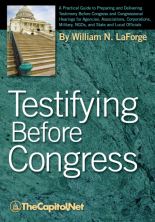Writing your Congressman or Congresswoman can be a great way to communicate your concerns regarding relevant issues. Today, most members of Congress prefer to hear from constituents through email due to the fact that it is faster, does not pose any security risks and is much easier to sort.
All members of Congress can be contacted through their web sites: House; Senate.
You can also contact your three Members of Congress by telephone; however, you should keep in mind that telephone calls are typically taken by a staff member and are not taken directly by your Representative or your Senators. When you telephone, you should ask to speak with the aide who handles the issue that is relevant to your concern. Make sure that you identify yourself as a constituent and tell the aide that you would like to leave a brief message. If you are calling to let the member know that you support or oppose a particular bill, be sure to mention the bill by name and give your reasons, briefly, for either supporting or opposing the bill. It is also a good idea to ask for your Senators’ or Representative’s position on the bill if you do not already have that information. You might also request a written response to your call.
If you choose to write to your Representative or Senators, begin by looking at their website and the ‘Contact’ page. This will usually connect you to an online form.
According to Congressional staffers you should include the following to ensure your message is as influential as possible; your name, address and zip code. This allows the staff to verify you as a constituent of the member of Congress. You should also reference specific legislation in your communication rather than simply a general reason for writing. (You can find bill numbers by using Thomas.)
Follow these tips when communicating with a member of Congress:
- Always be courteous and respectful. Never use threats.
- Be constructive rather than negative.
- Know your issue and be prepared to discuss it. Prior to writing make sure you have obtained information about the issue and do your homework to ensure you are knowledgeable about what you are discussing.
- Keep your comments factual, pertinent and brief. Do not try to cover more than one issue per communication.
- If you are writing a letter, restrict it to no more than two pages. Remember that elected officials hear from hundreds of people daily.
- Identify the subject within the first paragraph if you are writing a letter. Refer to the bill by the House or Senate bill number or title when possible.
- Do not use a form letter provided by any organization; use your own words to describe your concerns and proposed solutions.
For more information, see “What’s the deal with contacting my Representative or Senators?” and our FAQ: “How to Contact Congress.”
Courses
- Congressional Operations Briefing – Capitol Hill Workshop
- Drafting Federal Legislation and Amendments
- Writing for Government and Business: Critical Thinking and Writing
- Custom, On-Site Training
- Preparing and Delivering Congressional Testimony and Oral Presentations, a Five-Course series on CD
- Congress, the Legislative Process, and the Fundamentals of Lawmaking Series, a Nine-Course series on CD
Publications

Testifying Before Congress

Pocket Constitution

Citizen’s Handbook to Influencing Elected Officials: A Guide for Citizen Lobbyists and Grassroots Advocates

Congressional Procedure
CongressionalGlossary.com, from TheCapitol.Net
For more than 40 years, TheCapitol.Net and its predecessor, Congressional Quarterly Executive Conferences, have been teaching professionals from government, military, business, and NGOs about the dynamics and operations of the legislative and executive branches and how to work with them.
Our custom on-site and online training, publications, and audio courses include congressional operations, legislative and budget process, communication and advocacy, media and public relations, testifying before Congress, research skills, legislative drafting, critical thinking and writing, and more.
TheCapitol.Net is on the GSA Schedule, MAS, for custom on-site and online training. GSA Contract GS02F0192X
TheCapitol.Net is now owned by the Sunwater Institute.
Teaching how Washington and Congress work ™


